UST
-
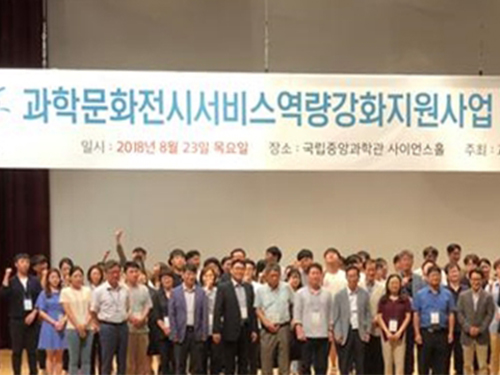 Adding Smart to Science Museum
KAIST and the National Science Museum (NSM) created an Exhibition Research Center for Smart Science to launch exhibitions that integrate emerging technologies in the Fourth Industrial Revolution, including augmented reality (AR), virtual reality (VR), Internet of Things (IoTs), and artificial intelligence (AI).
There has been a great demand for a novel technology for better, user-oriented exhibition services. The NSM continuously faces the problem of not having enough professional guides. Additionally, there have been constant complaints about its current mobile application for exhibitions not being very effective.
To tackle these problems, the new center was founded, involving 11 institutes and universities. Sponsored by the National Research Foundation, it will oversee 15 projects in three areas: exhibition-based technology, exhibition operational technology, and exhibition content.
The group first aims to provide a location-based exhibition guide system service, which allows it to incorporate various technological services, such as AR/VR to visitors. An indoor locating system named KAILOS, which was developed by KAIST, will be applied to this service. They will also launch a mobile application service that provides audio-based exhibition guides.
To further cater to visitors’ needs, the group plans to apply a user-centered ecosystem, a living lab concept to create pleasant environment for visitors.
“Every year, hundred thousands of young people visit the National Science Museum. I believe that the exhibition guide system has to be innovative, using cutting-edge IT technology in order to help them cherish their dreams and inspirations through science,” Jeong Heoi Bae, President of Exhibition and Research Bureau of NSM, emphasized.
Professor Dong Soo Han from the School of Computing, who took the position of research head of the group, said, “We will systematically develop exhibition technology and contents for the science museum to create a platform for smart science museums. It will be the first time to provide an exhibition guide system that integrates AR/VR with an indoor location system.”
The center will first apply the new system to the NSM and then expand it to 167 science museums and other regional museums.
2018.09.04 View 5601
Adding Smart to Science Museum
KAIST and the National Science Museum (NSM) created an Exhibition Research Center for Smart Science to launch exhibitions that integrate emerging technologies in the Fourth Industrial Revolution, including augmented reality (AR), virtual reality (VR), Internet of Things (IoTs), and artificial intelligence (AI).
There has been a great demand for a novel technology for better, user-oriented exhibition services. The NSM continuously faces the problem of not having enough professional guides. Additionally, there have been constant complaints about its current mobile application for exhibitions not being very effective.
To tackle these problems, the new center was founded, involving 11 institutes and universities. Sponsored by the National Research Foundation, it will oversee 15 projects in three areas: exhibition-based technology, exhibition operational technology, and exhibition content.
The group first aims to provide a location-based exhibition guide system service, which allows it to incorporate various technological services, such as AR/VR to visitors. An indoor locating system named KAILOS, which was developed by KAIST, will be applied to this service. They will also launch a mobile application service that provides audio-based exhibition guides.
To further cater to visitors’ needs, the group plans to apply a user-centered ecosystem, a living lab concept to create pleasant environment for visitors.
“Every year, hundred thousands of young people visit the National Science Museum. I believe that the exhibition guide system has to be innovative, using cutting-edge IT technology in order to help them cherish their dreams and inspirations through science,” Jeong Heoi Bae, President of Exhibition and Research Bureau of NSM, emphasized.
Professor Dong Soo Han from the School of Computing, who took the position of research head of the group, said, “We will systematically develop exhibition technology and contents for the science museum to create a platform for smart science museums. It will be the first time to provide an exhibition guide system that integrates AR/VR with an indoor location system.”
The center will first apply the new system to the NSM and then expand it to 167 science museums and other regional museums.
2018.09.04 View 5601 -
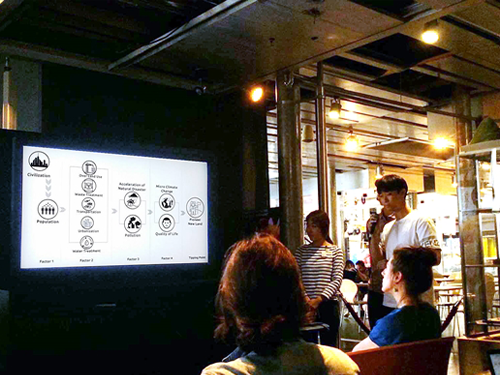 Participation in the 2018 Bio-Digital City Workshop in Paris
(A student make a presentatiion during the Bio-Digital City Workshop in Paris last month.)
KAIST students explored ideas for developing future cities during the 2018 Bio-Digital City Workshop held in Paris last month.
This international workshop hosted by Cité des Sciences et de l'Industrie was held under the theme “Biomimicry, Digital City and Big Data.” During the workshop from July 10 to July 20, students teamed up with French counterparts to develop innovative urban design ideas. Cité des Sciences et de l'Industrie is the largest science museum in Europe and is operated by Universcience, a specialized institute of science and technology in France.
Professor Seongju Chang from the Department of Civil and Environmental Engineering and Professor Jihyun Lee of the Graduate School of Culture Technology Students led the students group.
Participants presented their ideas and findings on new urban solutions that combine biomimetic systems and digital technology. Each student group analyzed a special natural ecosystem such as sand dunes, jellyfish communities, or mangrove forests and conducted research to extract algorithms for constructing sustainable urban building complexes based on the results. The extracted algorithm was used to conceive a sustainable building complex forming a part of the urban environment by applying it to the actual Parisian city segment given as the virtual site for the workshop.
Students from diverse background in both countries participated in this convergence workshop. KAIST students included Ph.D. candidate Hyung Min Cho, undergraduates Min-Woo Jeong, Seung-Hwan Cha, and Sang-Jun Park from the Department of Civil and Environmental Engineering, undergraduate Kyeong-Keun Seo from the Department of Materials Science and Engineering, JiWhan Jeong (Master’s course) from the Department of Industrial and Systems Engineering, Ph.D. candidate Bo-Yoon Zang from the Graduate School of Culture Technology. They teamed up with French students from diverse backgrounds, including Design/Science, Visual Design, Geography, Computer Science and Humanities and Social Science.
This workshop will serve as another opportunity to expand academic and human exchange efforts in the domain of smart and sustainable cities with Europe in the future as the first international cooperation activity of KAIST and the Paris La Villette Science Museum.
Professor Seong-Ju Chang who led the research group said, "We will continue to establish a cooperative relationship between KAIST and the European scientific community. This workshop is a good opportunity to demonstrate the competence of KAIST students and their scientific and technological excellence on the international stage.”
2018.08.01 View 7034
Participation in the 2018 Bio-Digital City Workshop in Paris
(A student make a presentatiion during the Bio-Digital City Workshop in Paris last month.)
KAIST students explored ideas for developing future cities during the 2018 Bio-Digital City Workshop held in Paris last month.
This international workshop hosted by Cité des Sciences et de l'Industrie was held under the theme “Biomimicry, Digital City and Big Data.” During the workshop from July 10 to July 20, students teamed up with French counterparts to develop innovative urban design ideas. Cité des Sciences et de l'Industrie is the largest science museum in Europe and is operated by Universcience, a specialized institute of science and technology in France.
Professor Seongju Chang from the Department of Civil and Environmental Engineering and Professor Jihyun Lee of the Graduate School of Culture Technology Students led the students group.
Participants presented their ideas and findings on new urban solutions that combine biomimetic systems and digital technology. Each student group analyzed a special natural ecosystem such as sand dunes, jellyfish communities, or mangrove forests and conducted research to extract algorithms for constructing sustainable urban building complexes based on the results. The extracted algorithm was used to conceive a sustainable building complex forming a part of the urban environment by applying it to the actual Parisian city segment given as the virtual site for the workshop.
Students from diverse background in both countries participated in this convergence workshop. KAIST students included Ph.D. candidate Hyung Min Cho, undergraduates Min-Woo Jeong, Seung-Hwan Cha, and Sang-Jun Park from the Department of Civil and Environmental Engineering, undergraduate Kyeong-Keun Seo from the Department of Materials Science and Engineering, JiWhan Jeong (Master’s course) from the Department of Industrial and Systems Engineering, Ph.D. candidate Bo-Yoon Zang from the Graduate School of Culture Technology. They teamed up with French students from diverse backgrounds, including Design/Science, Visual Design, Geography, Computer Science and Humanities and Social Science.
This workshop will serve as another opportunity to expand academic and human exchange efforts in the domain of smart and sustainable cities with Europe in the future as the first international cooperation activity of KAIST and the Paris La Villette Science Museum.
Professor Seong-Ju Chang who led the research group said, "We will continue to establish a cooperative relationship between KAIST and the European scientific community. This workshop is a good opportunity to demonstrate the competence of KAIST students and their scientific and technological excellence on the international stage.”
2018.08.01 View 7034 -
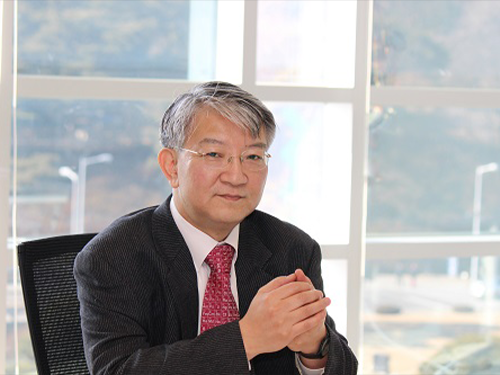 Distinguished Professor Lee Receives 2018 George Washington Carver Award
(Distinguished Professor Lee)
Distinguished Professor Sang Yup Lee from the Department of Chemical and Biomolecular Engineering will become the 11th recipient of the George Washington Carver Award. The award ceremony will be held during the 2018 Biotechnology Innovation Organization (BIO) World Congress on Industrial Biotechnology from July 16 through 19 at the Pennsylvania Convention Center in Philadelphia.
The annual Carver award recognizes an individual who has made a significant contribution to building the bio-based economy by applying industrial biotechnology to create environmentally sustainable products. It serves as a lasting memorial to the original vision of George Washington Carver who, over a century ago, pioneered bio-based products, materials, and energy derived from renewable agricultural feedstock. Previous recipients include the founder and CEO of POET Jeff Broin, the CEO of DuPont Ellen Kullman, and Professor Gregory Stephanopoulos at MIT.
Professor Lee is a pioneering scholar of systems metabolic engineering, leveraging technology to develop microbial bioprocesses for the sustainable and environment-friendly production of chemicals, fuels, and materials from non-food renewable biomass. He also serves as the dean of the multi-and interdisciplinary research center hub, KAIST Institute.Through his work, Professor Lee has garnered countless achievements, including being one of only 13 people in the world elected as a foreign member of both the National Academy of Sciences USA and the National Academy of Engineering USA.
He has actively promoted the importance of industrial biotechnology through engagement with the public, policymakers, and decision makers around the world. He currently serves as the co-chairman of the Global Future Council on Biotechnology for the World Economic Forum and served as the Chairman of the Emerging Technologies Council and Biotechnology Council for the World Economic Forum.
Upon the award announcement, Dr. Brent Erickson, executive vice president of BIO’s Industrial & Environmental Section lauded Professor Lee’s achievement, saying “Dr. Lee has advanced the bio-based economy by developing innovative products and processes that are sustainable and environmentally friendly. In doing so, he has become a leader in advocating on the importance of industrial biotechnology. His contributions to the advancement of the industry are a continuation of the legacy left behind by George Washington Carver.”
Professor Lee thanked his research team who has worked together for the past few decades, adding, “Industrial biotechnology is becoming increasingly important to help achieve the UN’s Sustainable Development Goals. We should continue to work together to advance the field and establish a solid foundation for the sustainable future.”
The George Washington Carver Award is sponsored by the Iowa Biotechnology Association. Joe Hrdlicka, executive director of the Iowa Biotechnology Association, said, “Dr. Sang Yup Lee’s significant contributions to the advancement of industrial biotechnology make him the perfect recipient for the George Washington Carver Award. Having published more than 575 peer-reviewed papers, contributed to 82 books, and holding 636 patents, the culmination of Dr. Lee’s work has led to the establishment of sustainable systems for bio-based production of chemicals, fuels, and materials, thus reducing environmental impact and improving quality of life for all.”
2018.07.12 View 7305
Distinguished Professor Lee Receives 2018 George Washington Carver Award
(Distinguished Professor Lee)
Distinguished Professor Sang Yup Lee from the Department of Chemical and Biomolecular Engineering will become the 11th recipient of the George Washington Carver Award. The award ceremony will be held during the 2018 Biotechnology Innovation Organization (BIO) World Congress on Industrial Biotechnology from July 16 through 19 at the Pennsylvania Convention Center in Philadelphia.
The annual Carver award recognizes an individual who has made a significant contribution to building the bio-based economy by applying industrial biotechnology to create environmentally sustainable products. It serves as a lasting memorial to the original vision of George Washington Carver who, over a century ago, pioneered bio-based products, materials, and energy derived from renewable agricultural feedstock. Previous recipients include the founder and CEO of POET Jeff Broin, the CEO of DuPont Ellen Kullman, and Professor Gregory Stephanopoulos at MIT.
Professor Lee is a pioneering scholar of systems metabolic engineering, leveraging technology to develop microbial bioprocesses for the sustainable and environment-friendly production of chemicals, fuels, and materials from non-food renewable biomass. He also serves as the dean of the multi-and interdisciplinary research center hub, KAIST Institute.Through his work, Professor Lee has garnered countless achievements, including being one of only 13 people in the world elected as a foreign member of both the National Academy of Sciences USA and the National Academy of Engineering USA.
He has actively promoted the importance of industrial biotechnology through engagement with the public, policymakers, and decision makers around the world. He currently serves as the co-chairman of the Global Future Council on Biotechnology for the World Economic Forum and served as the Chairman of the Emerging Technologies Council and Biotechnology Council for the World Economic Forum.
Upon the award announcement, Dr. Brent Erickson, executive vice president of BIO’s Industrial & Environmental Section lauded Professor Lee’s achievement, saying “Dr. Lee has advanced the bio-based economy by developing innovative products and processes that are sustainable and environmentally friendly. In doing so, he has become a leader in advocating on the importance of industrial biotechnology. His contributions to the advancement of the industry are a continuation of the legacy left behind by George Washington Carver.”
Professor Lee thanked his research team who has worked together for the past few decades, adding, “Industrial biotechnology is becoming increasingly important to help achieve the UN’s Sustainable Development Goals. We should continue to work together to advance the field and establish a solid foundation for the sustainable future.”
The George Washington Carver Award is sponsored by the Iowa Biotechnology Association. Joe Hrdlicka, executive director of the Iowa Biotechnology Association, said, “Dr. Sang Yup Lee’s significant contributions to the advancement of industrial biotechnology make him the perfect recipient for the George Washington Carver Award. Having published more than 575 peer-reviewed papers, contributed to 82 books, and holding 636 patents, the culmination of Dr. Lee’s work has led to the establishment of sustainable systems for bio-based production of chemicals, fuels, and materials, thus reducing environmental impact and improving quality of life for all.”
2018.07.12 View 7305 -
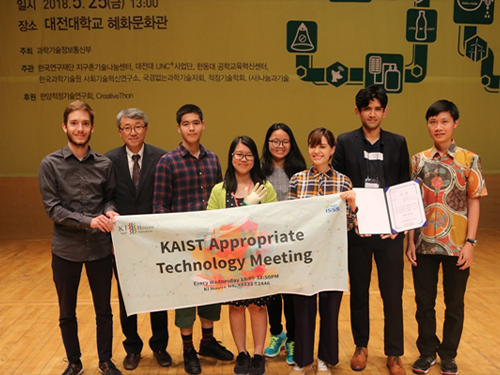 KAIST Team Reaching Out with Appropriate Technology
(The gold prize winning team of KATT)
The KAIST Appropriate Technology Team (KATT) consisting of international students at KAIST won the gold and silver prizes at ‘The 10th Creative Design Competition for the Other 90 Percent.’
More than 218 students from 50 teams nationwide participated in the competition hosted by the Ministry of Science and ICT last month.
The competition was created to discover appropriate technology and sustainable design items to enhance the quality of life for those with no or few accessible technologies.
A team led by Juan Luis Gonzalez Bello, graduate student from the School of Electrical Engineering received the gold prize for presenting a prosthetic arm. Their artificial arm was highly recognized for its affordability and good manageability. The team said that it cost less than 10 US dollars to construct from materials available in underprivileged regions and was easy to assemble.
Sophomore Hutomo Calvin from the Department of Materials Science & Engineering also worked on the prosthetic arm project with freshmen Bella Godiva, Stephanie Tan, and Koptieuov Yearbola.
Alexandra Tran, senior from the School of Electrical Engineering led the silver prize winning team. Her team developed a portable weather monitor, ‘Breathe Easy’. She worked with Alisher Tortay, senior from the School of Computing, Ashar Alam, senior from the Department of Mechanical Engineering, Bereket Eshete, junior from the School of Computing, and Marthens Hakzimana, sophomore from the Department of Mechanical Engineering.
This weather monitor is a low-cost but efficient air quality monitor. The team said it just cost less than seven US dollars to construct the monitor.KAIST students have now won the gold prize for two consecutive years.
2018.06.19 View 7233
KAIST Team Reaching Out with Appropriate Technology
(The gold prize winning team of KATT)
The KAIST Appropriate Technology Team (KATT) consisting of international students at KAIST won the gold and silver prizes at ‘The 10th Creative Design Competition for the Other 90 Percent.’
More than 218 students from 50 teams nationwide participated in the competition hosted by the Ministry of Science and ICT last month.
The competition was created to discover appropriate technology and sustainable design items to enhance the quality of life for those with no or few accessible technologies.
A team led by Juan Luis Gonzalez Bello, graduate student from the School of Electrical Engineering received the gold prize for presenting a prosthetic arm. Their artificial arm was highly recognized for its affordability and good manageability. The team said that it cost less than 10 US dollars to construct from materials available in underprivileged regions and was easy to assemble.
Sophomore Hutomo Calvin from the Department of Materials Science & Engineering also worked on the prosthetic arm project with freshmen Bella Godiva, Stephanie Tan, and Koptieuov Yearbola.
Alexandra Tran, senior from the School of Electrical Engineering led the silver prize winning team. Her team developed a portable weather monitor, ‘Breathe Easy’. She worked with Alisher Tortay, senior from the School of Computing, Ashar Alam, senior from the Department of Mechanical Engineering, Bereket Eshete, junior from the School of Computing, and Marthens Hakzimana, sophomore from the Department of Mechanical Engineering.
This weather monitor is a low-cost but efficient air quality monitor. The team said it just cost less than seven US dollars to construct the monitor.KAIST students have now won the gold prize for two consecutive years.
2018.06.19 View 7233 -
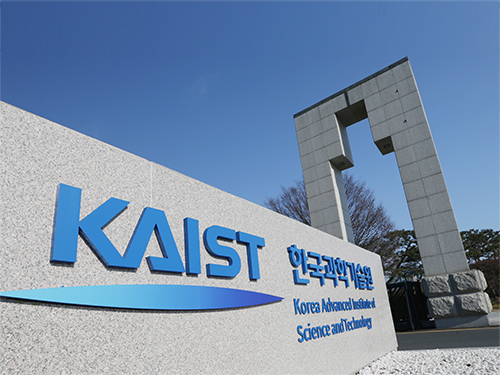 The Center for Anthropocene Studies (CAS) Opens
KAIST will start Anthropocene research, a convergence field of study, to address issues related to the commencement of human activities that have had scientific, industrial, and economic impacts on the Earth’s ecosystem. The National Research Foundation (NRF) of Korea endorsed the KAIST Center for Anthropocene Studies as its Convergence Research Center project.
Anthropocene refers to a new geological age in which various polluting materials that humans have made during the post-industrial revolution era have made a significant impact on the Earth and the lives of humankind. The studies expand the diverse socio-economic and environmental sectors for responding to climate change, natural disasters, ecological destruction, the polarization of the inequality and wealth, and many others.
The KAIST research group at the center, in collaboration with the Graduate School of Science and Technology Policy, the Graduate School of Culture Technology, the School of Humanities & Social Sciences, the Department of Industrial Design, the School of Electrical Engineering, the Satellite Technology Research Center (SaRTec), and the KAIST Initiative for Disaster Studies will conduct multidisciplinary research to address intriguing challenges with complex but creative approaches incorporating the fields of engineering, socioeconomics, and art.
The group will investigate topics such as▲ surface and marine changes to the Earth by applying satellite data ▲disaster prediction and governance system building through AI modeling ▲sustainable housing, transportation, and lifestyles ▲ engineering and artistic approaches for envisioning a new future for humankind and the Earth.
Professor Buhm Soon Park, who is in charge of the center, said, “This pioneering research work will inspire the re-creation of a new paradigm of convergence studies in science, engineering, humanities, and social science. We will contribute to making the world better by designing new technologies and social policies.
2018.06.05 View 7730
The Center for Anthropocene Studies (CAS) Opens
KAIST will start Anthropocene research, a convergence field of study, to address issues related to the commencement of human activities that have had scientific, industrial, and economic impacts on the Earth’s ecosystem. The National Research Foundation (NRF) of Korea endorsed the KAIST Center for Anthropocene Studies as its Convergence Research Center project.
Anthropocene refers to a new geological age in which various polluting materials that humans have made during the post-industrial revolution era have made a significant impact on the Earth and the lives of humankind. The studies expand the diverse socio-economic and environmental sectors for responding to climate change, natural disasters, ecological destruction, the polarization of the inequality and wealth, and many others.
The KAIST research group at the center, in collaboration with the Graduate School of Science and Technology Policy, the Graduate School of Culture Technology, the School of Humanities & Social Sciences, the Department of Industrial Design, the School of Electrical Engineering, the Satellite Technology Research Center (SaRTec), and the KAIST Initiative for Disaster Studies will conduct multidisciplinary research to address intriguing challenges with complex but creative approaches incorporating the fields of engineering, socioeconomics, and art.
The group will investigate topics such as▲ surface and marine changes to the Earth by applying satellite data ▲disaster prediction and governance system building through AI modeling ▲sustainable housing, transportation, and lifestyles ▲ engineering and artistic approaches for envisioning a new future for humankind and the Earth.
Professor Buhm Soon Park, who is in charge of the center, said, “This pioneering research work will inspire the re-creation of a new paradigm of convergence studies in science, engineering, humanities, and social science. We will contribute to making the world better by designing new technologies and social policies.
2018.06.05 View 7730 -
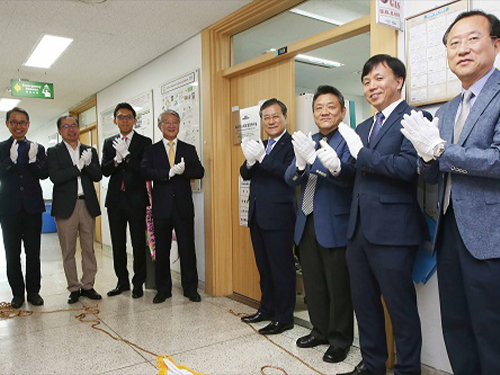 Cross-Generation Collaborative Labs Open
KAIST opened two cross-generation collaborative labs last month. This novel approach will pair up senior and junior faculty members for sustaining research and academic achievements even after the senior researcher retires.
This is one of the Vision 2031 innovation initiatives established to extend the spectrum of knowledge and research competitiveness. The selected labs will be funded for five years and the funding will be extended if necessary. KAIST will continue to select new labs every year.
A five-member selection committee including the Nobel Laureates Professor Klaus Von Klitzing at the Max-Planck Institute for Solid State Research and Dr. Kurt Wüthrich from ETH Zürich selected the first two labs with senior-junior pairs in March.
(Two renowned scholars' Cross-Generation Collaborative Labs which opened last month.
Distinguished Professor Lee's lab (above) andChair Professor Sung's lab)
Both labs are run by world-renowned scholars: the Systems Metabolic Engineering and Systems Healthcare Laboratory headed by Distinguished Professor Sang-Yup Lee in the Department of Chemical and Biomolecular Engineering and the Acousto-Microfluidics Research Center for Next-Generation Healthcare led by Chair Professor Hyung Jin Sung in the Department of Mechanical Engineering.
Distinguished Professor Lee will be teamed up with Professor Hyun Uk Kim, and their lab aims to mass produce new eco-friendly chemical materials as well as higher-value-added materials which will be used for medicine. The new platform technologies created in the lab are expected to provide information which will benefit human healthcare.
Meanwhile, the Acousto-Microfluidics Research Center for Next-Generation Healthcare will team up with Professors Hyoungsoo Kim and Yeunwoo Cho under Chair Professor Sung. The lab will conduct research on controlling fluids and objects exquisitely on a micro-nano scale by using high-frequency acoustic waves. The lab plans to develop a next-generation healthcare platform for customized diagnoses as well as disease treatment.
KAIST President Sung-Chul Shin, who introduced this novel idea in his research innovation initiative, said that he hopes the Cross-Generation Collaborative Labs will contribute to honoring senior scholars’ research legacies and passing knowledge down to junior researchers in order to further develop their academic achievements. He said, “I sincerely hope the labs will make numerous research breakthroughs in the very near future.”
2018.05.03 View 7586
Cross-Generation Collaborative Labs Open
KAIST opened two cross-generation collaborative labs last month. This novel approach will pair up senior and junior faculty members for sustaining research and academic achievements even after the senior researcher retires.
This is one of the Vision 2031 innovation initiatives established to extend the spectrum of knowledge and research competitiveness. The selected labs will be funded for five years and the funding will be extended if necessary. KAIST will continue to select new labs every year.
A five-member selection committee including the Nobel Laureates Professor Klaus Von Klitzing at the Max-Planck Institute for Solid State Research and Dr. Kurt Wüthrich from ETH Zürich selected the first two labs with senior-junior pairs in March.
(Two renowned scholars' Cross-Generation Collaborative Labs which opened last month.
Distinguished Professor Lee's lab (above) andChair Professor Sung's lab)
Both labs are run by world-renowned scholars: the Systems Metabolic Engineering and Systems Healthcare Laboratory headed by Distinguished Professor Sang-Yup Lee in the Department of Chemical and Biomolecular Engineering and the Acousto-Microfluidics Research Center for Next-Generation Healthcare led by Chair Professor Hyung Jin Sung in the Department of Mechanical Engineering.
Distinguished Professor Lee will be teamed up with Professor Hyun Uk Kim, and their lab aims to mass produce new eco-friendly chemical materials as well as higher-value-added materials which will be used for medicine. The new platform technologies created in the lab are expected to provide information which will benefit human healthcare.
Meanwhile, the Acousto-Microfluidics Research Center for Next-Generation Healthcare will team up with Professors Hyoungsoo Kim and Yeunwoo Cho under Chair Professor Sung. The lab will conduct research on controlling fluids and objects exquisitely on a micro-nano scale by using high-frequency acoustic waves. The lab plans to develop a next-generation healthcare platform for customized diagnoses as well as disease treatment.
KAIST President Sung-Chul Shin, who introduced this novel idea in his research innovation initiative, said that he hopes the Cross-Generation Collaborative Labs will contribute to honoring senior scholars’ research legacies and passing knowledge down to junior researchers in order to further develop their academic achievements. He said, “I sincerely hope the labs will make numerous research breakthroughs in the very near future.”
2018.05.03 View 7586 -
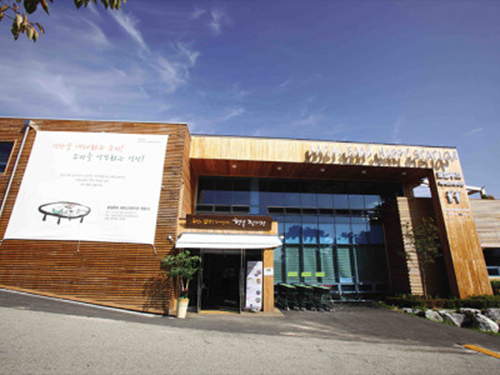 KAIST Develops IoT Platform for Food Safety
A research team led by the KAIST Auto-ID Labs developed a GS1 international standard-based IoTs infrastructure platform dubbed Oliot (Open Language of Internet of Things). This platform will be applied to Wanju Local Food, the nation’s largest cooperative, and will be in operation from April 5.
A total of eleven organizations participated in the development of Oliot, with KAIST as the center. This consortium is based on the GS1 international standard-based Oliot platform, which allows collecting and sharing data along the entire process of agrifood from production to processing, distribution, and consumption. It aims at increasing farm incomes and establishing a global ecosystem of domestic agriculture and stockbreeding that provides safe food.
Wanju Local Food is now the world’s first local food co-op with a traceability system from the initial stage of production planning to end sales based on GS1 international standards, which will ensure food safety.
KAIST has been sharing Oliot data in order to apply it to industries around the world. As of April 2018, approximately 900 enterprises and developers from more than 100 countries have downloaded it.
Professor Daeyoung Kim from the School of Computing, who is also Research Director of Auto-ID Labs said, “We are planning to disseminate Oliot to local food cooperatives throughout the nation. We will also cooperate with other countries, like China, Holland, and Hong Kong to create a better ecosystem for the global food industry.
“We are currently collaborating with related business to converge Oliot with AI or blockchain technology that can be applied to various services, such as healthcare and smart factories. Its tangible outcome will be revealed soon,” he added.
Auto-ID Labs are a global research consortium of six academic institutions that research and develop new technologies for advancing global commerce, partnering with GS1 (Global Standard 1), a non-profit organization that established standards for global commerce such as introducing barcodes to the retail industry. The Auto-ID Labs include MIT, University of Cambridge, Keio University, Fudan University, ETH Zurich/University of St. Gallen, and KAIST.
The consortium was supported by the Ministry of Science and ICT as well as the Institute for Information and Communications Technology Promotion for three years from 2015.
The launching of Oliot at Wanju Local Food will be held on April 5.
2018.04.03 View 6221
KAIST Develops IoT Platform for Food Safety
A research team led by the KAIST Auto-ID Labs developed a GS1 international standard-based IoTs infrastructure platform dubbed Oliot (Open Language of Internet of Things). This platform will be applied to Wanju Local Food, the nation’s largest cooperative, and will be in operation from April 5.
A total of eleven organizations participated in the development of Oliot, with KAIST as the center. This consortium is based on the GS1 international standard-based Oliot platform, which allows collecting and sharing data along the entire process of agrifood from production to processing, distribution, and consumption. It aims at increasing farm incomes and establishing a global ecosystem of domestic agriculture and stockbreeding that provides safe food.
Wanju Local Food is now the world’s first local food co-op with a traceability system from the initial stage of production planning to end sales based on GS1 international standards, which will ensure food safety.
KAIST has been sharing Oliot data in order to apply it to industries around the world. As of April 2018, approximately 900 enterprises and developers from more than 100 countries have downloaded it.
Professor Daeyoung Kim from the School of Computing, who is also Research Director of Auto-ID Labs said, “We are planning to disseminate Oliot to local food cooperatives throughout the nation. We will also cooperate with other countries, like China, Holland, and Hong Kong to create a better ecosystem for the global food industry.
“We are currently collaborating with related business to converge Oliot with AI or blockchain technology that can be applied to various services, such as healthcare and smart factories. Its tangible outcome will be revealed soon,” he added.
Auto-ID Labs are a global research consortium of six academic institutions that research and develop new technologies for advancing global commerce, partnering with GS1 (Global Standard 1), a non-profit organization that established standards for global commerce such as introducing barcodes to the retail industry. The Auto-ID Labs include MIT, University of Cambridge, Keio University, Fudan University, ETH Zurich/University of St. Gallen, and KAIST.
The consortium was supported by the Ministry of Science and ICT as well as the Institute for Information and Communications Technology Promotion for three years from 2015.
The launching of Oliot at Wanju Local Food will be held on April 5.
2018.04.03 View 6221 -
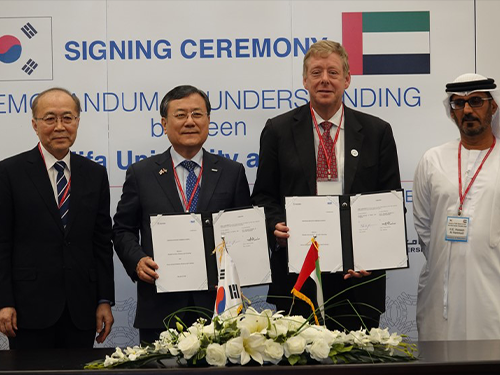 KAIST-KU Sign MOU on 4th Industrial Technology Development
(President Shin(second from left) poses with Khalifa University President Tod Laursen after signing an MOU in the UAE on March 25. Far left is Chairman of the NST Kwangyun Wohn and far right is the UAE Minister of Educatiion Hussain Al Hammadi.)
KAIST President Sung-Chul Shin and Khalifa University Interim President Tod Laursen signed an MOU on the Fourth Industrial Technology Development on March 25 in the UAE.
They signed the MOU during the UAE-ROK Nuclear Friendship and KAIST Alumni Night at Khalifa University co-hosted by KAIST and the Korea Atomic Energy Research Institute (KAERI). The MOU will bring new opportunities to further expand bilateral cooperation in education and training in the relevant technologies called for the era of the Fourth Industrial Revolution.
More than 100 dignitaries including Chairman of National Research Council of Science and Technology (NST) in Korea Dr. Kwangyun Wohn, President of KAERI Jaejoo Ha, the UAE Minister of Education His Excellency Hussain Al Hammadi, Minister of State for Advanced Sciences Her Excellency Sarah bint Yousef Al Amiri, and His Excellency Federal Authority for Nuclear Regulation (FANR) Director General Christopher Viktorsson attended the event. In particular, a significant number of Emirati graduates of the KUSTAR-KAIST education program and many others who completed various KAIST training programs joined the event.
The Nuclear Friendship Night was celebrating the completion of the first nuclear power plant in Barakah exported by Korea. This is the first nuclear reactor in the Middle East, which is to start operation later this year. The event also coincided with Korean President Moon Jae-In’s state visit to the UAE.
KAIST and KAERI gathered distinguished leaders from the higher education and nuclear industries at the event in response to the UAE government’s top national agenda of fostering future talents and promoting the nuclear industry in order to ensure energy security.
KAIST and Khalifa University signed an initial agreement in education and research in 2009 when the governments of Korea and the UAE signed a contract to build four nuclear power plants in Barakah. Since then, the two universities have worked together closely in the areas of nuclear engineering, bio-medical engineering, robotics, mechanical engineering, chemical engineering, and materials science. With this signing on the new MOU, the partnership between the two institutions will mark the second phase of educating high-caliber human resources in science and technology of the two countries.
The KAIST Alumni Night also brought more opportunities to appreciate the achievements that the two countries have made through collaboration in education and research, mostly represented in the field of nuclear technology between KAIST and Khalifa University. During the event, KAIST graduates also shared their experiences from the education at KAIST, followed by the welcoming speeches from the UAE Minister of Education and the UAE Minister of State for Advanced Sciences.
KAIST President Shin, in his welcoming speech at the event, said, “I look forward to more students in the UAE having the opportunity to experience the world’s top-level education and global environment that KAIST offers. The collaboration with Khalifa University and the UAE is very important for building both countries’ future growth.”
KU President Laursen said, “This MOU on research cooperation focusing on technologies for the Fourth Industrial Revolution, nuclear engineering, and other technical areas will further consolidate our partnership with KAIST and support us in developing human capital suitable to take on future challenges in the science and technology sectors. We firmly believe the talent pool of experts created by this initiative will contribute to the overall economic growth of the UAE.”
2018.03.26 View 6821
KAIST-KU Sign MOU on 4th Industrial Technology Development
(President Shin(second from left) poses with Khalifa University President Tod Laursen after signing an MOU in the UAE on March 25. Far left is Chairman of the NST Kwangyun Wohn and far right is the UAE Minister of Educatiion Hussain Al Hammadi.)
KAIST President Sung-Chul Shin and Khalifa University Interim President Tod Laursen signed an MOU on the Fourth Industrial Technology Development on March 25 in the UAE.
They signed the MOU during the UAE-ROK Nuclear Friendship and KAIST Alumni Night at Khalifa University co-hosted by KAIST and the Korea Atomic Energy Research Institute (KAERI). The MOU will bring new opportunities to further expand bilateral cooperation in education and training in the relevant technologies called for the era of the Fourth Industrial Revolution.
More than 100 dignitaries including Chairman of National Research Council of Science and Technology (NST) in Korea Dr. Kwangyun Wohn, President of KAERI Jaejoo Ha, the UAE Minister of Education His Excellency Hussain Al Hammadi, Minister of State for Advanced Sciences Her Excellency Sarah bint Yousef Al Amiri, and His Excellency Federal Authority for Nuclear Regulation (FANR) Director General Christopher Viktorsson attended the event. In particular, a significant number of Emirati graduates of the KUSTAR-KAIST education program and many others who completed various KAIST training programs joined the event.
The Nuclear Friendship Night was celebrating the completion of the first nuclear power plant in Barakah exported by Korea. This is the first nuclear reactor in the Middle East, which is to start operation later this year. The event also coincided with Korean President Moon Jae-In’s state visit to the UAE.
KAIST and KAERI gathered distinguished leaders from the higher education and nuclear industries at the event in response to the UAE government’s top national agenda of fostering future talents and promoting the nuclear industry in order to ensure energy security.
KAIST and Khalifa University signed an initial agreement in education and research in 2009 when the governments of Korea and the UAE signed a contract to build four nuclear power plants in Barakah. Since then, the two universities have worked together closely in the areas of nuclear engineering, bio-medical engineering, robotics, mechanical engineering, chemical engineering, and materials science. With this signing on the new MOU, the partnership between the two institutions will mark the second phase of educating high-caliber human resources in science and technology of the two countries.
The KAIST Alumni Night also brought more opportunities to appreciate the achievements that the two countries have made through collaboration in education and research, mostly represented in the field of nuclear technology between KAIST and Khalifa University. During the event, KAIST graduates also shared their experiences from the education at KAIST, followed by the welcoming speeches from the UAE Minister of Education and the UAE Minister of State for Advanced Sciences.
KAIST President Shin, in his welcoming speech at the event, said, “I look forward to more students in the UAE having the opportunity to experience the world’s top-level education and global environment that KAIST offers. The collaboration with Khalifa University and the UAE is very important for building both countries’ future growth.”
KU President Laursen said, “This MOU on research cooperation focusing on technologies for the Fourth Industrial Revolution, nuclear engineering, and other technical areas will further consolidate our partnership with KAIST and support us in developing human capital suitable to take on future challenges in the science and technology sectors. We firmly believe the talent pool of experts created by this initiative will contribute to the overall economic growth of the UAE.”
2018.03.26 View 6821 -
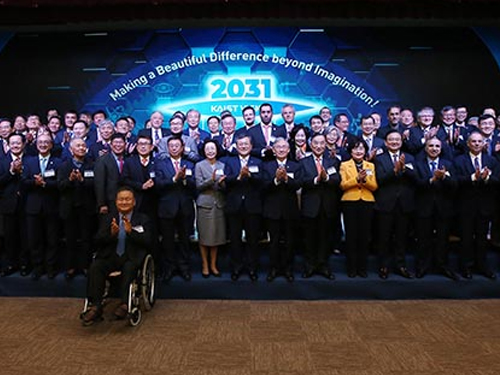 KAIST Unveils Vision 2031, a Blueprint for KAIST's Future
(Participants at the Vision 2031 Declaration Ceremony pose after the ceremony on March 20.)
KAIST presented a blueprint for KAIST’s future, “Vision 2031” looking toward its 60th anniversary. The strategic development plan for a “Global Value-Creative Leading University” aims at being one of the top universities in the world by the year 2031.
Unveiling its 2031 Vision, KAIST President Sung-Chul Shin presented the three-stage, five-year action plan during a ceremony held on March 20.
He stressed that innovation in the five pillars of education, research, technology commercialization, globalization, and future strategy will further advance the excellence of KAIST, to help it become a trailblazer in Korea and beyond.
President Shin said that Vision 2031 holds a special meaning, as the full support of the KAIST community was garnered to complete this shared vision for KAIST.
Approximately 140 members of the Vision Committee participated in the brainstorming process over the past ten months for reaching this vision. The committee went through consensus building procedures of public hearings engaging all of the stakeholders on campus as well as outside experts. The committee published “Vision 2031: KAIST’s Future Report” this month, detailing the action plan of innovation strategies for reaching its new vision as well as an expanded budget funding plan to secure 2 trillion KRW by 2031, up from the current 860 billion KRW.
First, in education, KAIST will foster creative leaders who will translate the knowledge created by science and technology into social values. In research, KAIST will conduct research projects to address both national and global challenges. KAIST will pursue becoming an entrepreneurial university that will enrich its technological value. In globalization innovation, KAIST will move forward to serve as a world bridge. Lastly, KAIST will steer toward the ‘What’ (problem definition) over the ‘How’ (problem solving) for addressing challenges in pursuing future strategy innovation.
The ceremony was held in Chung Kunmo Hall, in the newly opened the Academic Cultural Complex, with an attendance of more than 300 distinguished guests including global leaders in higher education, government, and industry, as well as from KAIST community.
Noted participants from abroad included KAIST President’s Advisory Council members such as Former President of ETH Zurich Rlaph Eichler, President of HKUST Tony Chan, President-elect Kazuya Masu of the Tokyo Institute of Technology, Former President of the National University of Singapore Tan Chorh Chuan, Nobel laureate Professor Kurt Wuthrich of the Scripps Research Institute, and Professor Klaus von Klitzing from the Max Planck Institute for Solid State Research. Former KAIST Presidents including Dr. Nam-Pyo Suh, Chairman of JoongAng Holdings Seok-hyun Hong, Elsevier Chairman Youngsuk Chi, KISWE Mobile Executive Chairman Jeong H. Kim also attended the ceremony.
In honor of the Vision 2031 declaration, KAIST is hosting 25 events during Vision Week from March 19 to 23 across the campus including academic forums, distinguished lectures, exhibits, and a coding challenge, among others. The opening of the Academic Cultural Center, an iconic building accommodating the new library, Cultural Building, and Vision Hall, launched Vision Week on Monday, March 19.
KAIST also dedicated Chung Kunmo Hall in the Academic Cultural Complex, a 300-seat capacity multi-purpose hall in honor of Professor Keun-Mo Chung, who played an instrumental role in founding KAIST in 1971.
Professor Chung submitted the proposal to US Aid to establish KAIST in 1969. US Aid asked the vice-president of Stanford University at the time, Frederick Terman, to conduct a feasibility study on the establishment of KAIST. The Terman Report, approving the founding of KAIST, was published in 1970 and KAIST was founded the next year. Following the dedication of Terman Hall in 2004, KAIST has now inducted its two founding figures.
“We had the guidebook of the Terman Report back then. We faithfully accomplished the initial mission and goals the Terman Report contained. At this critical juncture of the new global environment, we need to establish a new vision to continue to develop. As much as the Terman Report drove us to our current success, I hope the Vision 2031 KAIST Future Report will advance KAIST to its new chapter,” President Shin said.
Stressing that the ideal KAISTian is defined by the 3C spirit: Challenge, Creativity, and Caring, President Shin said, “Members of KAIST are expected to embrace challenges, generate creative ideas, and care for others. By recommitting to the five innovation strategies equipped with the KAIST spirit, KAIST will emerge as one of the top universities of science and technology by the year 2031 and contribute to the happiness and prosperity of humankind. I hope KAIST will be a great source of pride for Koreans and lay the foundation for Korea to take the lead in the age of the Fourth Industrial Revolution.”
2018.03.20 View 5561
KAIST Unveils Vision 2031, a Blueprint for KAIST's Future
(Participants at the Vision 2031 Declaration Ceremony pose after the ceremony on March 20.)
KAIST presented a blueprint for KAIST’s future, “Vision 2031” looking toward its 60th anniversary. The strategic development plan for a “Global Value-Creative Leading University” aims at being one of the top universities in the world by the year 2031.
Unveiling its 2031 Vision, KAIST President Sung-Chul Shin presented the three-stage, five-year action plan during a ceremony held on March 20.
He stressed that innovation in the five pillars of education, research, technology commercialization, globalization, and future strategy will further advance the excellence of KAIST, to help it become a trailblazer in Korea and beyond.
President Shin said that Vision 2031 holds a special meaning, as the full support of the KAIST community was garnered to complete this shared vision for KAIST.
Approximately 140 members of the Vision Committee participated in the brainstorming process over the past ten months for reaching this vision. The committee went through consensus building procedures of public hearings engaging all of the stakeholders on campus as well as outside experts. The committee published “Vision 2031: KAIST’s Future Report” this month, detailing the action plan of innovation strategies for reaching its new vision as well as an expanded budget funding plan to secure 2 trillion KRW by 2031, up from the current 860 billion KRW.
First, in education, KAIST will foster creative leaders who will translate the knowledge created by science and technology into social values. In research, KAIST will conduct research projects to address both national and global challenges. KAIST will pursue becoming an entrepreneurial university that will enrich its technological value. In globalization innovation, KAIST will move forward to serve as a world bridge. Lastly, KAIST will steer toward the ‘What’ (problem definition) over the ‘How’ (problem solving) for addressing challenges in pursuing future strategy innovation.
The ceremony was held in Chung Kunmo Hall, in the newly opened the Academic Cultural Complex, with an attendance of more than 300 distinguished guests including global leaders in higher education, government, and industry, as well as from KAIST community.
Noted participants from abroad included KAIST President’s Advisory Council members such as Former President of ETH Zurich Rlaph Eichler, President of HKUST Tony Chan, President-elect Kazuya Masu of the Tokyo Institute of Technology, Former President of the National University of Singapore Tan Chorh Chuan, Nobel laureate Professor Kurt Wuthrich of the Scripps Research Institute, and Professor Klaus von Klitzing from the Max Planck Institute for Solid State Research. Former KAIST Presidents including Dr. Nam-Pyo Suh, Chairman of JoongAng Holdings Seok-hyun Hong, Elsevier Chairman Youngsuk Chi, KISWE Mobile Executive Chairman Jeong H. Kim also attended the ceremony.
In honor of the Vision 2031 declaration, KAIST is hosting 25 events during Vision Week from March 19 to 23 across the campus including academic forums, distinguished lectures, exhibits, and a coding challenge, among others. The opening of the Academic Cultural Center, an iconic building accommodating the new library, Cultural Building, and Vision Hall, launched Vision Week on Monday, March 19.
KAIST also dedicated Chung Kunmo Hall in the Academic Cultural Complex, a 300-seat capacity multi-purpose hall in honor of Professor Keun-Mo Chung, who played an instrumental role in founding KAIST in 1971.
Professor Chung submitted the proposal to US Aid to establish KAIST in 1969. US Aid asked the vice-president of Stanford University at the time, Frederick Terman, to conduct a feasibility study on the establishment of KAIST. The Terman Report, approving the founding of KAIST, was published in 1970 and KAIST was founded the next year. Following the dedication of Terman Hall in 2004, KAIST has now inducted its two founding figures.
“We had the guidebook of the Terman Report back then. We faithfully accomplished the initial mission and goals the Terman Report contained. At this critical juncture of the new global environment, we need to establish a new vision to continue to develop. As much as the Terman Report drove us to our current success, I hope the Vision 2031 KAIST Future Report will advance KAIST to its new chapter,” President Shin said.
Stressing that the ideal KAISTian is defined by the 3C spirit: Challenge, Creativity, and Caring, President Shin said, “Members of KAIST are expected to embrace challenges, generate creative ideas, and care for others. By recommitting to the five innovation strategies equipped with the KAIST spirit, KAIST will emerge as one of the top universities of science and technology by the year 2031 and contribute to the happiness and prosperity of humankind. I hope KAIST will be a great source of pride for Koreans and lay the foundation for Korea to take the lead in the age of the Fourth Industrial Revolution.”
2018.03.20 View 5561 -
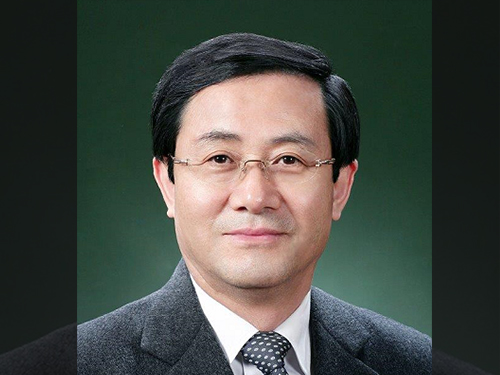 Professor Emeritus Jung Ki Park Won the IBA Technology Award 2018
(Professor Emeritus Jung Ki Park)
Professor Emeritus Jung Ki Park from the Department of Chemical and Biomolecular Engineering received the IBA Technology Award from the International Battery Association (IBA).
IBA 2018 was held from March 11 to 16 on Jeju Island, which was the first time it was hosted in Korea. The conference was an excellent opportunity to let the world know the level of the Korean rechargeable battery industry and its technology.
Professor Park delivered his keynote speech titled Advances in Lithium Batteries in Korea at the conference and received the IBA Technology Award as the first Korean recipient.
Professor Park is a world-renowned scholar who was a groundbreaker in the rechargeable battery industry. He was recognized by the IBA Award Committee for his contributions carrying out research and development, fostering competent people, and enhancing the lithium rechargeable battery industry in Korea over the last 30 years.
Professor Park said, “It is my great honor to receive this award, which is the best international award in the field of rechargeable batteries. I would like to share this with my colleagues and students. As competition in the rechargeable industry intensifies, systemic cooperation among industries, academia, and government is needed for the continued development of the battery industry in Korea.
2018.03.19 View 4759
Professor Emeritus Jung Ki Park Won the IBA Technology Award 2018
(Professor Emeritus Jung Ki Park)
Professor Emeritus Jung Ki Park from the Department of Chemical and Biomolecular Engineering received the IBA Technology Award from the International Battery Association (IBA).
IBA 2018 was held from March 11 to 16 on Jeju Island, which was the first time it was hosted in Korea. The conference was an excellent opportunity to let the world know the level of the Korean rechargeable battery industry and its technology.
Professor Park delivered his keynote speech titled Advances in Lithium Batteries in Korea at the conference and received the IBA Technology Award as the first Korean recipient.
Professor Park is a world-renowned scholar who was a groundbreaker in the rechargeable battery industry. He was recognized by the IBA Award Committee for his contributions carrying out research and development, fostering competent people, and enhancing the lithium rechargeable battery industry in Korea over the last 30 years.
Professor Park said, “It is my great honor to receive this award, which is the best international award in the field of rechargeable batteries. I would like to share this with my colleagues and students. As competition in the rechargeable industry intensifies, systemic cooperation among industries, academia, and government is needed for the continued development of the battery industry in Korea.
2018.03.19 View 4759 -
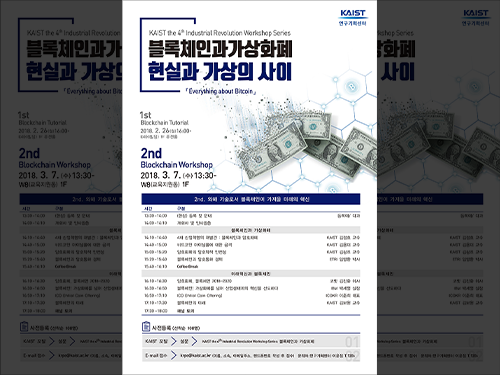 Blockchain and Cryptocurrency: Between Reality and Virtuality
A workshop on blockchain and cryptocurrency, one of the 4th Industrial Revolution Workshop Series, was held at the KAIST main campus on March 7.
Experts from industry, academia, and research gathered and shared their opinions about blockchain technology, which is currently gaining huge attention along with cryptocurrency.
During the workshop, four KAIST professors and four experts from institutes and business examined the scope on the possibility of blockchain, technology for the Fourth Industrial Revolution.
Moreover, they discussed a variety of issues including mining, wallets, cryptocurrency, information security, smart contracts, and ICOs.
In a previous blockchain tutorial, Professor Yongdae Kim from the School of Electrical Engineering at KAIST and Professor Hyoungshick Kim from Sungkyunkwan University opened up a blockchain tutorial which provided a technical understanding of blockchain, such as the birth of cryptocurrency, algorithm design, and exchange methods.
Professor Jungho Kim, who is in charge of this event, said, “This workshop will broaden the understanding of blockchain, which can provide a foundation for a national growth engine.”
2018.03.07 View 5597
Blockchain and Cryptocurrency: Between Reality and Virtuality
A workshop on blockchain and cryptocurrency, one of the 4th Industrial Revolution Workshop Series, was held at the KAIST main campus on March 7.
Experts from industry, academia, and research gathered and shared their opinions about blockchain technology, which is currently gaining huge attention along with cryptocurrency.
During the workshop, four KAIST professors and four experts from institutes and business examined the scope on the possibility of blockchain, technology for the Fourth Industrial Revolution.
Moreover, they discussed a variety of issues including mining, wallets, cryptocurrency, information security, smart contracts, and ICOs.
In a previous blockchain tutorial, Professor Yongdae Kim from the School of Electrical Engineering at KAIST and Professor Hyoungshick Kim from Sungkyunkwan University opened up a blockchain tutorial which provided a technical understanding of blockchain, such as the birth of cryptocurrency, algorithm design, and exchange methods.
Professor Jungho Kim, who is in charge of this event, said, “This workshop will broaden the understanding of blockchain, which can provide a foundation for a national growth engine.”
2018.03.07 View 5597 -
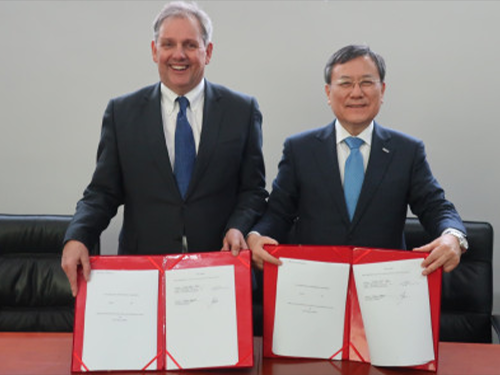 KAIST to Host the THE Innovation & Impact Summit in 2019
KAIST and Times Higher Education (THE) agreed to co-host the THE Innovation & Impact Summit at KAIST from April 1 to 3, 2019.
Global leaders from higher education, government, and industry will gather at KAIST to discuss how universities can better innovate for creating a greater impact.
(from left: THE Managing Director Trevor Barratt and KAIST President Sung-Chul Shin)
President Sung-Chul Shin and Trevor Barratt, managing director at the THE, signed an agreement to host the 2019 THE Innovation & Impact Summit at KAIST next April. The agreement was signed on February 6 during the THE Asia Universities Summit held at SUSTech in Shenzhen in China. Phil Baty, editorial director at the THE was also present during the agreement.
By hosting the 2019 THE Innovation & Impact Summit, KAIST has a chance to introduce its innovative research and performance and its educational environment and startup ecosystem to the world. Having educational and industrial leaders meet at KAIST will add more power to the global status and capacity of KAIST.
The THE Innovation & Impact Summit, first held in 2017, is one in the seven presidential summit series held by THE. During the second summit at KAIST, THE will launch their world university innovation rankings for the first time.
As innovation at universities and its impact have been a crucial indicator in building an institutional brand and reputation, leading universities are gearing up to encourage startups and entrepreneurship education. Even more, innovation at universities is emerging as one of the growth engines of economies.
The innovation indicators of KAIST have been highly recognized by many global ranking institutions in terms of the volume of patents and the patents-to-article citation impact. Thomson Reuters has recognized KAIST for two consecutive years as the most innovative university in Asia, and sixth in the world.
President Shin has high expectations for the hosting of the Innovation & Impact Summit at KAIST. He explained, “Innovation makes up the DNA of KAIST and it has been our institutional mission from the start in 1971. KAIST was commissioned to make innovation for industrialization and economic development through education and research. I do not see any university more suitable than KAIST to host this innovation summit. I hope the summit at KAIST will serve as a global platform to provide very creative ideas for making innovation and collaboration among the leading universities for all the participants.”
Meanwhile, at the THE Asia Universities Summit in Shenzhen, how to respond to the implications of the Fourth Industrial Revolution was the key agenda piercing the two-day sessions.
As a panelist, President Shin shared his experiences on innovative strategies viable for spearheading university reform for the Fourth Industrial Revolution, along with Vice-Chancellor of the University of Sheffield Sir Keith Burnett, President of Monash University Margaret Gardner, and President of Hong Kong Polytechnic University President Timothy W. Tong. He said that universities should foster young talents by equipping them with creativity, collaboration, and convergent minds. To swiftly respond to the new industrial environment, President Shin said that universities should remove the high barriers between departments and establish cross- and inter-disciplinary education systems, convergence research and technology commercialization.
2018.02.06 View 6055
KAIST to Host the THE Innovation & Impact Summit in 2019
KAIST and Times Higher Education (THE) agreed to co-host the THE Innovation & Impact Summit at KAIST from April 1 to 3, 2019.
Global leaders from higher education, government, and industry will gather at KAIST to discuss how universities can better innovate for creating a greater impact.
(from left: THE Managing Director Trevor Barratt and KAIST President Sung-Chul Shin)
President Sung-Chul Shin and Trevor Barratt, managing director at the THE, signed an agreement to host the 2019 THE Innovation & Impact Summit at KAIST next April. The agreement was signed on February 6 during the THE Asia Universities Summit held at SUSTech in Shenzhen in China. Phil Baty, editorial director at the THE was also present during the agreement.
By hosting the 2019 THE Innovation & Impact Summit, KAIST has a chance to introduce its innovative research and performance and its educational environment and startup ecosystem to the world. Having educational and industrial leaders meet at KAIST will add more power to the global status and capacity of KAIST.
The THE Innovation & Impact Summit, first held in 2017, is one in the seven presidential summit series held by THE. During the second summit at KAIST, THE will launch their world university innovation rankings for the first time.
As innovation at universities and its impact have been a crucial indicator in building an institutional brand and reputation, leading universities are gearing up to encourage startups and entrepreneurship education. Even more, innovation at universities is emerging as one of the growth engines of economies.
The innovation indicators of KAIST have been highly recognized by many global ranking institutions in terms of the volume of patents and the patents-to-article citation impact. Thomson Reuters has recognized KAIST for two consecutive years as the most innovative university in Asia, and sixth in the world.
President Shin has high expectations for the hosting of the Innovation & Impact Summit at KAIST. He explained, “Innovation makes up the DNA of KAIST and it has been our institutional mission from the start in 1971. KAIST was commissioned to make innovation for industrialization and economic development through education and research. I do not see any university more suitable than KAIST to host this innovation summit. I hope the summit at KAIST will serve as a global platform to provide very creative ideas for making innovation and collaboration among the leading universities for all the participants.”
Meanwhile, at the THE Asia Universities Summit in Shenzhen, how to respond to the implications of the Fourth Industrial Revolution was the key agenda piercing the two-day sessions.
As a panelist, President Shin shared his experiences on innovative strategies viable for spearheading university reform for the Fourth Industrial Revolution, along with Vice-Chancellor of the University of Sheffield Sir Keith Burnett, President of Monash University Margaret Gardner, and President of Hong Kong Polytechnic University President Timothy W. Tong. He said that universities should foster young talents by equipping them with creativity, collaboration, and convergent minds. To swiftly respond to the new industrial environment, President Shin said that universities should remove the high barriers between departments and establish cross- and inter-disciplinary education systems, convergence research and technology commercialization.
2018.02.06 View 6055